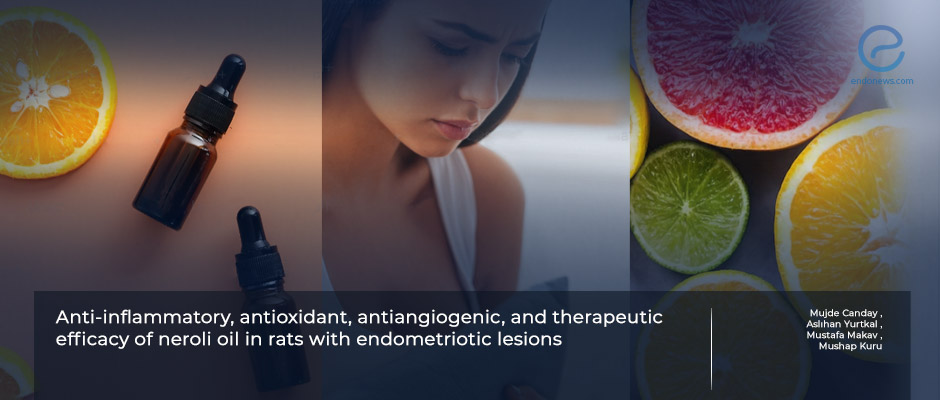A herbal product has promising results in experimental endometriosis
Jan 17, 2024
Neroli oil from the flowers of Citrus aurantium may be a potential remedy for endometriosis !
Key Points
Highlights:
- This experimental study highlights the potential of neroli oil in the treatment of endometriosis, based on its anti-inflammatory, antioxidant, and antiangiogenic properties
What’s done here:
- The authors conducted an experimental research on Albino Wistar female rats simulating an endometriosis model .
- Four group of rats were compared: A control, an endometriosis model, a neroli oil treated group, and a neroli oil treated group postendometriosis induction.
- Tumor necrosis factor-alpha (TNF-α), Interleukin 6, Interleukin 8, vascular endothelial growth factor (VEGF), myeloperoxidase, Matrix metalloproteinase-1 (MMP-1), nitric oxide, superoxide dismutase, catalase, and anti-mullerian hormone values, as well as histopathological evaluations of endometriotic foci were evaluated and compared between above groups.
Key results:
- Anti mullerian hormone levels were statistically significantly higher in the neroli oil treated endometriosis group when compared to the endometriosis group.
- Neroli oil treated groups had reduced inflammation and congestion besides less tissue modelling at microscopic assessment of tissue sections.
- Neroli oil also decreased MMP-1, nitric oxide, VEGF and TNF-α levels.
Potential limitations:
- As in every animal model of human disease the nature of experimental endometriosis is also debatable for extrapolation in patients.
- In addition the small sample size also is another challenge applying the results to human populations. Molecular and immunological studies could yield further enhancement the reliability of this experimental research.
Lay Summary
Neroli oil (bitter orange) is a nontoxic volatile substance from the flowers of Citrus aurantium that belongs to the Rutaceae family. This oil has notable anti-inflammatory effects besides potent antioxidant activity with 100% singlet oxygen scavenging activity. Contemporary pathophysiological views on endometriosis emphasize inflammatory etiology besides oxidative stress as the initiators and perpetuators of this notorious disease. Proinflammatory cytokines take major roles and progression of endometriotic lesions while vascularization has a crucial effect.
Dr. Mujde Canday and colleagues from Kars Kafkas University, Turkiye have published their experimental endometriosis model results with application of neroli oil (bitter orange) in a recent issue of Journal of Obstetrics and Gynaecology Research.
In this experimental study, albino Wistar female rats were used to simulate endometriosis with groups established for comparison: a control, an endometriosis model, a neroli oiltreated group, and a neroli oil treated group postendometriosis. The assessed tumor necrosis factor-alpha (TNF-α), interleukin 6, interleukin 8, vascular endothelial growth factor (VEGF), myeloperoxidase, matrix metalloproteinase-1, nitric oxide, superoxide dismutase, catalase, and anti-mullerian hormone values, as well as microoscopic evaluations of the endometriotic foci.
Anti mullerian hormone values showed a significant increase in the endometriosis induced group treated with neroli oil in comparison to the endometriosis group without treatment. A statistically significant decrease was found in MMP-1 level in the endometriosis group that had neroli oil. Increased catalase and decrease in nitric oxide are found in neroli oil treated endometriosis group. Neroli oil treated groups had reduced inflammation and congestion besides less tissue modelling at histopathologic assessments.
Plants and herbal medicinals yield remedies for human disease treatment through pharmacological effects and bioactive molecules. Neroli oil, as well has robust anti-inflammatory and antioxidant properties yielded positive results in this experimental model. However, this experimental endometriosis model is also debatable for extrapolation in patients. The small sample size also is a challenge in applying the results to human populations. Molecular and immunological studies would possibly facilitate solving questions on the reliability of this experimental research.
Research Source: https://pubmed.ncbi.nlm.nih.gov/38148005/
angiogenesis endometriosis endometriosis treatment herbal medicine inflammation neroli oil oxidative stress rat model tissue remodeling

